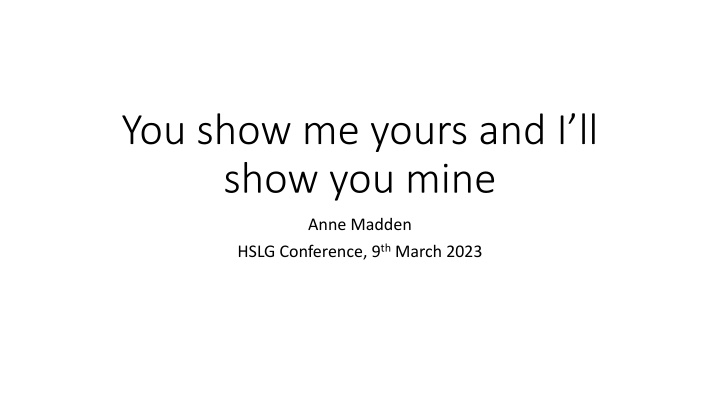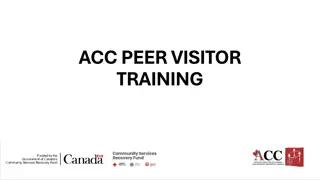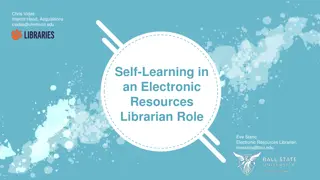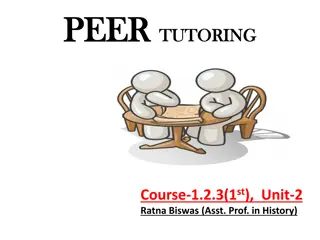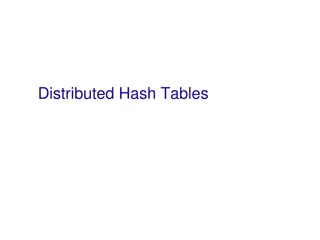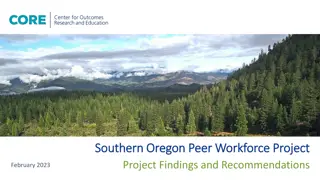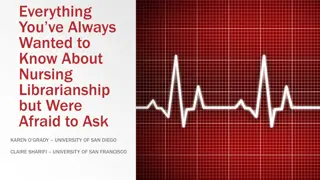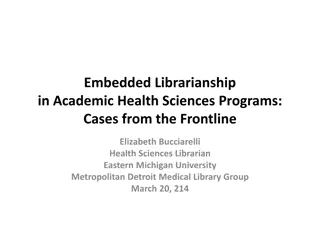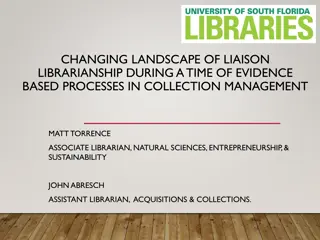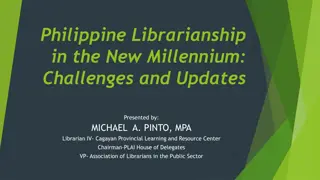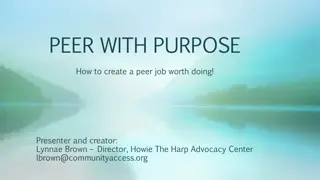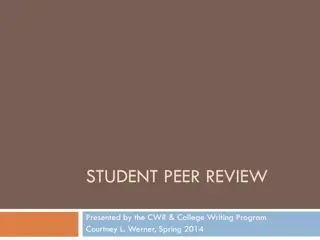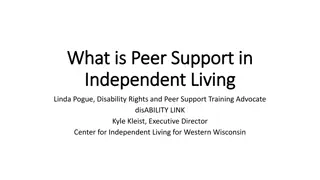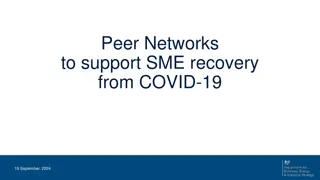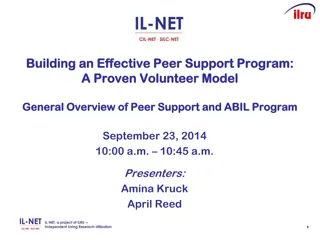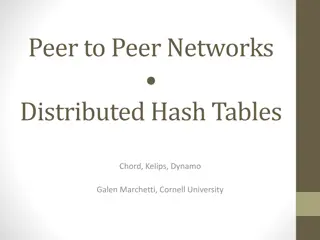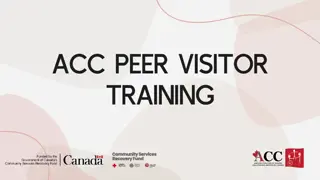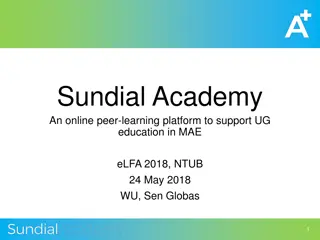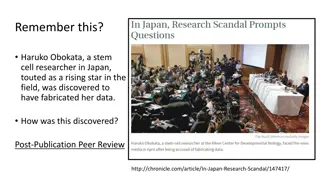Peer Learning Benefits and Practical Applications in Librarianship
Exploring the benefits of peer-to-peer learning in librarianship through real-life scenarios and research projects. Peer training enhances understanding, encourages questions, and provides a supportive environment for skill development. The MLA research project exemplifies collaborative learning with global volunteers conducting systematic reviews, fostering cross-cultural collaboration. Practical insights from conferences emphasize the enlightening nature of peer feedback and discussions.
Download Presentation

Please find below an Image/Link to download the presentation.
The content on the website is provided AS IS for your information and personal use only. It may not be sold, licensed, or shared on other websites without obtaining consent from the author.If you encounter any issues during the download, it is possible that the publisher has removed the file from their server.
You are allowed to download the files provided on this website for personal or commercial use, subject to the condition that they are used lawfully. All files are the property of their respective owners.
The content on the website is provided AS IS for your information and personal use only. It may not be sold, licensed, or shared on other websites without obtaining consent from the author.
E N D
Presentation Transcript
You show me yours and Ill show you mine Anne Madden HSLG Conference, 9thMarch 2023
Where it began a chat between Jean McMahon and Niamh Lucey
PubMed v EBSCO Medline v OVID Medline PubMed v EBSCO Medline v OVID Medline We met in St. Vincent s. There were eight of us we had a good discussion, we compared and contrasted, and swapped practice tips . Key takeaway: Feedback and questions from peers are very enlightening
Benefits of peer Benefits of peer- -to to- -peer learning gain a deeper understanding of the topic .. through the process of providing instruction and answering questions from the learner. By participating in a cooperative learning process, learners may find themselves more open and willing to ask questions of fellow librarians when feeling confused or unconfident in their skills. Peer training also allowed the librarians to practice their instruction and presentation skills in a low stress and friendly environment (Stark, R.K. and Aiello, M.T., 2021. Solo but Not Alone: Self-Directed Online Peer Education as a Way to Increase Professional Knowledge and Skills. Journal of hospital librarianship, 21(1), pp.1-10. Available at: https://www.tandfonline.com/doi/full/10.1080/15323269.2021.1860448) peer learning
The MLA research project The MLA research project Having identified a series of background questions to underpin their research agenda, they split volunteers from around the globe into teams to carry out Systematic Reviews on each of the research topics. This way, they got studies to guide their research and volunteers had the opportunity to work through a systematic review from start to finish, and to work with colleagues from different countries and settings. Boden, C., Ascher, M.T. and Eldredge, J.D., 2018. Learning while doing: program evaluation of the medical library association systematic review project. Journal of the Medical Library Association: JMLA, 106(3), p.284. Available at: https://jmla.pitt.edu/ojs/jmla/article/view/286
The peripheral participation model The peripheral participation model ..we ended up learning on the job with supervisors and colleagues teaching us what we needed as we needed it.. (p326) .. There is a growing body of research that suggests that learning on the job is by far the best way of accruing skills needed in the real world. (p327) However: Within such a system how can we be sure that we attain the right competencies to do our job well? (p326) Clarke, S. and Thomas, Z., 2011. Health librarians: developing professional competence through a legitimate peripheral participation model. Health Information & Libraries Journal, 28(4), pp.326-330. Available at: https://onlinelibrary.wiley.com/doi/pdf/10.1111/j.1471-1842.2010.00959.x
Your personal CPD record There is an ongoing initiative to create a personal portfolio where you can record all CPD-related activity, with credits assigned on the basis of time commitment, complexity, relevance etc. This would be totally self-managed, but guidance or a framework would be provided. Ideally, this would become a standard for health librarians internationally as well as at home.
Capturing soft skills e.g. creating an appetite for evidence, advocacy, reflective practice, creativity, etc Nick Poole: In favour of slow librarianship : Not everything that counts can be counted We need to stop allowing ourselves to be reduced to transactions, and to start taking credit instead for our transformations. Not by what we contain, or how efficiently we manage our processes, but by what we enable and empower.
I look forward to such an organization of the literary records of medicine that a puzzled worker in any part of the civilized world shall in an hour be able to gain a knowledge pertaining to a subject of the experience of every other man in the world. https://www.ncbi.nlm.nih.gov/pmc/articles/PMC2047412/pdf/medlib00048-0003.pdf
Thank you and never forget: We are librarians We read books We drink wine We know things
